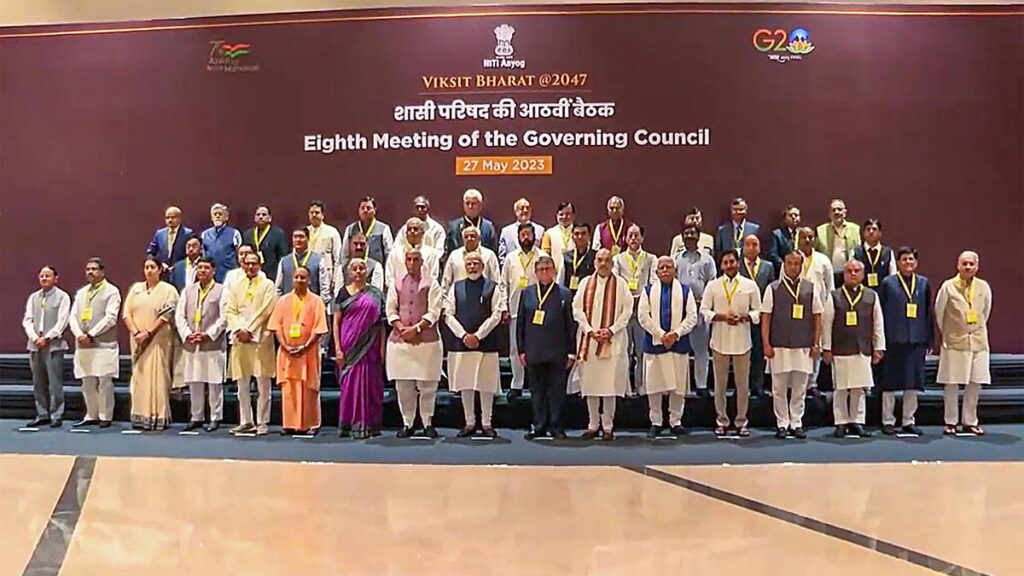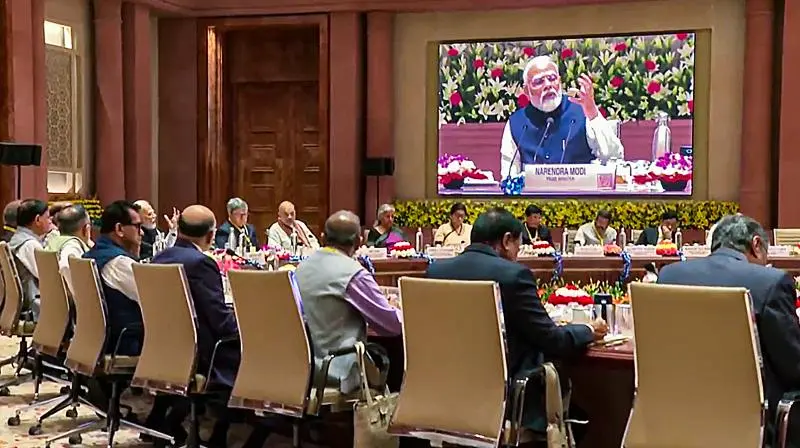PM Modi Chairs 8th Governing Council Meeting of NITI Aayog
The 8th Governing Council Meeting of NITI Aayog was recently chaired by Prime Minister Narendra Modi, where he emphasized the significance of a collaborative approach and the vision of achieving a developed nation by 2047. The meeting brought together key stakeholders from various sectors to discuss and deliberate on important policy matters. In this article, we will explore the key highlights and takeaways from the meeting.
Importance of Collaborative Approach
Collaboration and teamwork have always played a pivotal role in achieving national goals. Prime Minister Modi highlighted the importance of the “Team India” approach, emphasizing the need for different states and central government entities to work together towards the nation’s development. This inclusive approach aims to harness the collective potential and expertise of all stakeholders.
Key Highlights from the Meeting
During the meeting, several key issues were discussed, addressing various sectors crucial to the nation’s growth. One of the key highlights was the deliberation on strategies to accelerate economic growth and job creation. The participants brainstormed innovative ideas to boost entrepreneurship, enhance ease of doing business, and promote investment in both rural and urban areas.
Another crucial aspect discussed was the focus on infrastructure development. The participants emphasized the need to strengthen connectivity, improve transportation networks, and develop smart cities. The aim is to build a robust infrastructure that supports sustainable economic growth and ensures the well-being of citizens across the country.
The meeting also witnessed discussions on transforming India’s education system. Recognizing the role of education in shaping the future of the nation, PM Modi highlighted the importance of integrating technology and skill development into the curriculum. The emphasis was on empowering students with relevant knowledge and skills to meet the evolving demands of the job market.

Why this News is Important:
Significance of Collaboration and “Team India” Approach
The 8th Governing Council Meeting of NITI Aayog chaired by PM Modi holds immense importance for various reasons. Firstly, the emphasis on collaboration and the “Team India” approach underscores the significance of collective efforts in achieving the nation’s goals. By fostering cooperation between different states and central government entities, this approach promotes a synergistic and inclusive approach to development.
Secondly, the meeting’s focus on accelerating economic growth, job creation, and entrepreneurship is crucial in addressing the current challenges faced by the nation. By brainstorming innovative ideas and formulating effective strategies, the meeting aimed to boost the economy and create opportunities for individuals across various sectors.
Infrastructure Development and Education Transformation
Additionally, the discussions on infrastructure development and transforming the education system reflect the government’s commitment to holistic progress. Strengthening connectivity, improving transportation networks, and developing smart cities are vital for sustainable economic growth and enhancing the quality of life for citizens.
The integration of technology and skill development in the education system is essential to equip students with the necessary knowledge and competencies. This focus ensures that future generations are prepared to meet the demands of the rapidly evolving job market, thereby contributing to the overall development of the nation.
Historical Context:
NITI Aayog: Transforming India’s Development Agenda
The establishment of NITI Aayog in 2015 marked a significant shift in India’s approach to governance and development planning. It replaced the erstwhile Planning Commission and aimed to foster cooperative federalism, promote sustainable development, and provide a platform for evidence-based policymaking.
Since its inception, NITI Aayog has played a vital role in shaping India’s development agenda. It has facilitated the implementation of various initiatives and programs aimed at promoting inclusive growth, enhancing governance, and addressing socio-economic challenges.
Key Takeaways from “PM Modi Chairs 8th Governing Council Meeting of NITI Aayog”
| Serial Number | Key Takeaway |
|---|---|
| 1. | Collaboration and the “Team India” approach are crucial for achieving a developed nation. |
| 2. | Strategies for economic growth, job creation, and entrepreneurship were discussed. |
| 3. | Infrastructure development, connectivity, and smart city initiatives were highlighted. |
| 4. | Transforming education with technology and skill development was a key focus. |
| 5. | NITI Aayog plays a significant role as a think tank for policy formulation. |
Important FAQs for Students from this News
Q: What is the purpose of the Governing Council Meeting of NITI Aayog?
A: The Governing Council Meeting of NITI Aayog serves as a platform for key stakeholders to discuss and deliberate on important policy matters related to the nation’s development.
Q: What is the “Team India” approach highlighted in the article?
A: The “Team India” approach emphasizes collaboration and cooperation between different states and central government entities to work collectively towards the nation’s development goals.
Q: What were the key highlights discussed during the 8th Governing Council Meeting?
A: The key highlights of the meeting included strategies for accelerating economic growth, job creation, infrastructure development, and transforming the education system to align with the evolving needs of the job market.
Q: How does NITI Aayog contribute to India’s development agenda?
A: NITI Aayog, as a think tank for policy formulation, plays a significant role in shaping India’s development agenda by facilitating the implementation of initiatives focused on inclusive growth, governance improvement, and addressing socio-economic challenges.
Q: What is the historical context of NITI Aayog?
A: NITI Aayog was established in 2015 as a replacement for the Planning Commission. It aims to promote cooperative federalism, sustainable development, and evidence-based policymaking in India.
Some Important Current Affairs Links

















